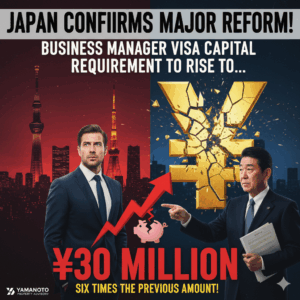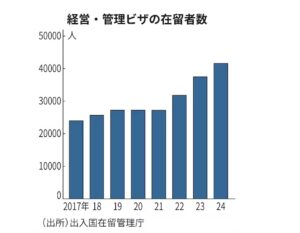
A Game Changer — Japan Raises the Business Manager Visa Bar to Global Standards
Introduction
Earlier on LinkedIn, we shared that Japan was preparing to tighten requirements for the Business Manager Visa—a residence status for foreign nationals who establish companies or manage significant business operations in Japan.
This reform has now entered its final stage. On August 26, the Immigration Services Agency released a Ministry Ordinance draft for public comment, the last step before implementation. In line with past practice, there is little doubt that the new rules will take effect in mid-October 2025.
Key Changes Under the New Framework
- Capital Requirement: Increased sixfold, from ¥5 million to ¥30 million.
- Full-Time Employee: At least one permanent staff member must be employed—now a mandatory requirement alongside the capital condition.
- Experience/Education: Applicants must demonstrate three years of management experience or hold a graduate-level degree in business management.
- Business Plan Verification: Plans must be reviewed and confirmed by a licensed professional (such as a certified public accountant or small and medium enterprise consultant).
- Residency Duration: The visa will continue to allow a stay of up to five years.

Background and Rationale
- Sharp Increase in Visa Holders: As of 2024, approximately 41,000 foreign nationals held a Business Manager Visa, a 50% increase compared with five years earlier. More than half were Chinese nationals, whose numbers doubled since 2015.
- Abuse of the System: Critics in the National Diet noted that the visa had become a “loophole” for foreigners to settle in Japan through shell companies or paper firms with no real business operations, often tied to short-term lodging businesses.
- International Comparison:
- South Korea requires capital of ₩300 million (approx. ¥32 million).
- The United States requires USD 100,000–200,000 (approx. ¥15–30 million).
Japan’s existing threshold of ¥5 million was considered unusually lenient by comparison.
- Policy Objective: The Japanese government aims to align with global standards and ensure that only well-capitalized, serious entrepreneurs or corporate managers use this visa category.

Sharp Rise in Business Manager Visa Holders — Now Over 40,000 (Source: Immigration Services Agency / Nikkei)
Debate and Concerns
While the reform is designed to curb abuse, some experts have voiced concerns:
- Excluding Genuine Entrepreneurs: Raising the bar too high could discourage legitimate foreign entrepreneurs who have strong intent but limited initial capital.
- Alternative Measures Suggested: Experts at advisory panels proposed stricter monitoring at the time of visa renewal, rather than solely raising upfront requirements.
- Enforcement Challenges: Immigration officials admitted that manpower is limited, and currently on-site inspections are only conducted when application documents appear suspicious.
This shows that while the new rules may deter fraudulent cases, there are still structural challenges in enforcement.
Implications for Foreign Entrepreneurs and Corporates
- Entrepreneurs: Small-scale ventures will find it very difficult to qualify. Those aiming for Japan with limited seed capital should instead explore the Startup Visa, which is tailored to early-stage businesses.
- Corporate Subsidiaries: Multinational companies establishing a Japanese branch or appointing managers will still use the Business Manager Visa, though they must meet the new capital and staffing standards.
- Real Estate Sector: With fewer shell companies, particularly in the minpaku (short-term lodging) sector, the market may experience less speculative activity and greater transparency.
- Overall Impact: Japan is signaling a shift toward quality over quantity in its acceptance of foreign business operators.

Looking Ahead
With the public comment period now underway, the reform is almost certain to be finalized and implemented in October 2025. For foreign investors and corporate managers, this represents both a challenge—as entry barriers rise—and an opportunity, as Japan seeks to attract only credible, long-term business commitments.
It is important to emphasize that this article does not constitute official legal advice.
I am not a licensed immigration lawyer or gyoseishoshi (administrative scrivener).
The authority to define what qualifies as “business” for the purposes of the Business Manager Visa lies entirely with the Japanese government and immigration authorities.
That said, recent updates make it evident that passive real estate investment or short-term rentals managed entirely by third parties will not satisfy the requirements. Applicants will need to demonstrate direct involvement in management and decision-making.
At Yamamoto Property Advisory, we support foreign investors, multinational companies, and entrepreneurs in navigating Japan’s regulatory and real estate environment. With these new rules set to take effect, careful planning and professional guidance will be more critical than ever.
👉 CONTACT US TODAY or email yamamoto@yamamoto-property.jp to discuss how these changes may affect your business or investment strategy in Japan.

Source: Nikkei article (In Japanse)
About Toshihiko Yamamoto
Toshihiko Yamamoto is the founder and principal broker of Yamamoto Property Advisory, specializing in luxury and investment properties for an international clientele. With over two decades of global business experience and a CCIM designation, he provides trusted guidance to foreign investors navigating Japan’s real estate market.
📘 Author of “The Savvy Foreign Investor’s Guide to Japanese Properties” – available on Amazon, iBooks, and Google Play.
👉 Connect with us for exclusive listings and investment insights:
-
LINE – Direct inquiries in Japan
-
WhatsApp – International client contact
-
Instagram – Market snapshots & updates
-
YouTube – In-depth video analysis
Scan below to connect instantly.



About the book
Amazon.com Link

#JapanRealEstate #BusinessManagerVisa #ImmigrationPolicy #ForeignInvestment #TokyoProperty #MarketUpdate
